After six years, an anti-quota student movement has formed again in Bangladesh. The students have now united under the name ‘anti-discrimination student movement’. They are continuing this protracted movement with the goal of a permanent solution to the quota system in government jobs.
This student movement, formed on the one-point demand of quota reform, has spread across the country. Students of various universities and colleges of the country are participating in this movement regardless of party affiliation and they have announced that their movement will continue until their demands are met.
A single demand of these protesting students to the executive department of the government.
It is said in one of them – ‘The quota system should be reformed by passing a law in the parliament by abolishing unreasonable and discriminatory quotas in all grades of government jobs and bringing the quotas for the backward groups and those with special needs to the minimum level on the basis of fairness as mentioned in the constitution.’
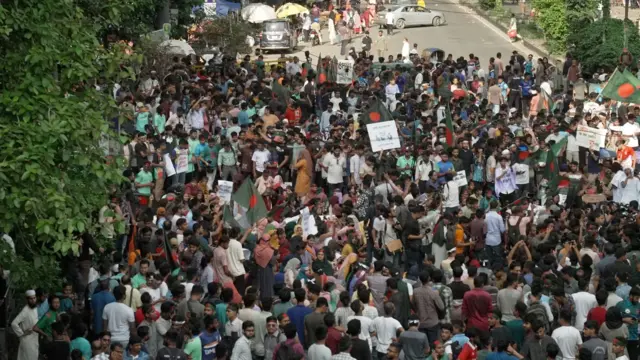
How students are organized
The quota reform movement was seen spreading rapidly in July. A large number of students are participating in every program of the movement. Constantly boycotting class exams to demand quota reform is going on.
Around Dhaka and Jahangirnagar University, it can be seen that students have used social media to unite in this movement. Besides, students are organized by creating networks based on various universities, halls of residence and departments.
The general students of different departments in the university themselves participated in the movement by printing anti-quota posters, placards and banners. They created small funds themselves for the needs of the movement.
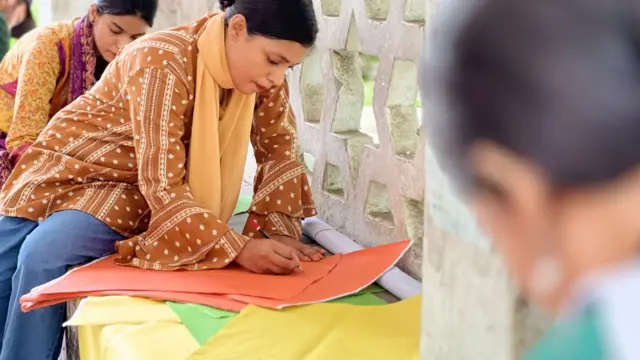
IMAGE SOURCE,ABUL KALAM AZAD/BBC
Coordinators liaised with residence halls on campus to increase student participation. Leaflets in support of the movement were also seen distributed in Dhaka University and residential halls.
The students of Jahangirnagar University have been vocal in this movement since the beginning. They are protesting along the Dhaka Aricha highway in coordination with the central program.
It is known that a convening committee has been formed to organize the students. They have used various strategies to promote the movement. Micking in the campus, hall hall mass communication.
The students named the road blockade and sit-in program in this movement as ‘Bangla Blockade’. In coordination with Dhaka University, the movement has spread from Khulna to Chittagong, Barisal to Sylhet, Rajshahi-Comilla and other universities and colleges.
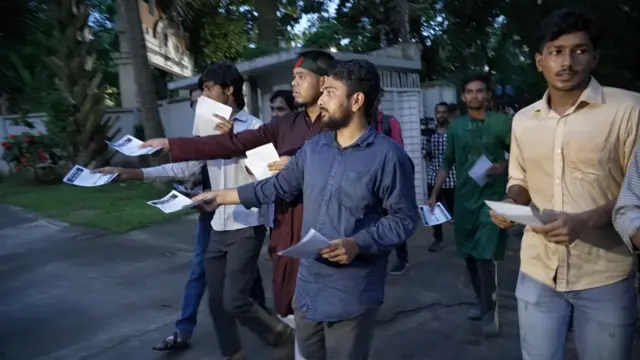
Nahid Islam, the coordinator of the anti-discrimination student movement, told BBC Bangla that the group is communicating through online meetings and social media to inform and coordinate the movement and program.
“We are meeting through various online channels including Facebook and trying to take decisions together. By meeting directly with those who are carrying out the program in Dhaka, we are sharing the various points, different universities will be at which points, which halls will take positions at which points. In this way, we are coordinating the movement.”
Participation of female students
At the beginning of the anti-quota movement, the presence of female students was less, but now in Dhaka, they are seen participating in marches in groups. Girls are participating in the march by writing posters with slogans like ‘No Women Quota Chai’.
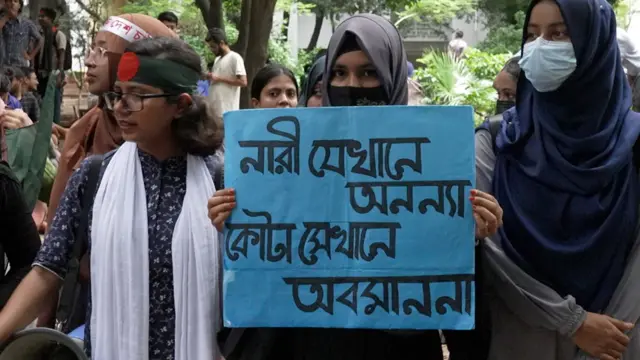
Rafia Rehnuma Hridi, a student of Dhaka University’s Bangladesh-Kuwait Friendship Hall, is a coordinator of the movement. Regarding how the participation of the female students of the hall has been increased, he said that they have carried out various activities to move the female students towards the movement.
“The female presence was not that much from the beginning. Through the Halla Hall campaign, those who want to come to the movement but could not come due to various obstacles, the obstacles are reviewed. They are encouraged. When groups in the hall are informed about the program of movement and when to leave, women students are participating spontaneously.”
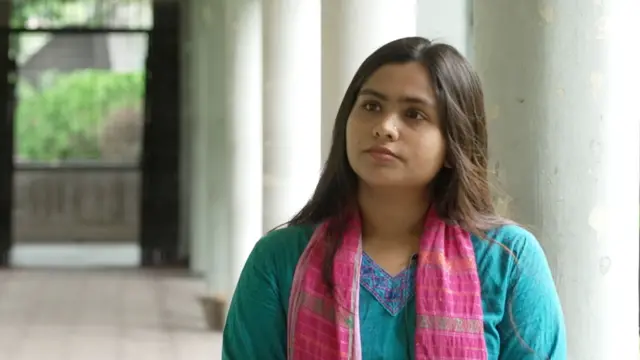
Farhana Binte Zigar, an organizer of Jahangirnagar University in the movement, said that women representatives worked in residential halls to increase the participation of female students in Jahangirnagar. The issues and rationale of the movement were discussed and disseminated in the library.
“Jahangirnagar University is far from the city. It’s just us here. We are trying to spread word of mouth as much as possible. Micking. I am constantly keeping the program. Many are joining us despite the siege after siege.”
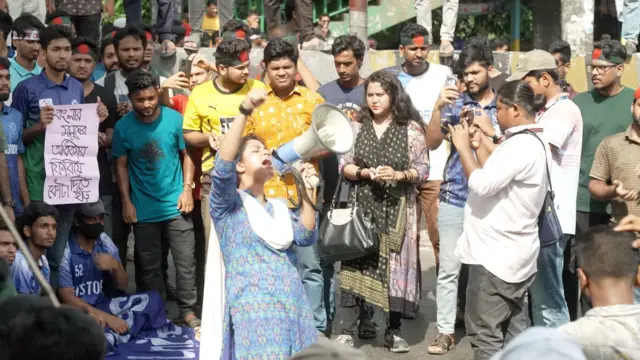
Who led the anti-discrimination student movement?
Under the banner of ‘anti-discrimination student movement’, no single spokesperson was selected in the movement this time. A coordinating committee of 65 members has been formed to organize the movement across the country. Where there are 23 coordinators in different universities outside Dhaka and Dhaka.
Nahid Islam, number one coordinator of the committee said, “We have not kept any single leadership, single spokesperson. Anyone who is our coordinator can come forward and speak at any time. There is no single leadership here.”

Arif Sohail is coordinating the quota reform movement in Jahangirnagar University. He is now one of the central coordinators in the quota reform movement.
He said, “This time we are a little aware; We do not see positively an individualistic or some individualistic leadership. We want the movement to be very spontaneous with a democratic character as it is a democratic demand and the demand of the people across the country.”
Among those who are in the Coordinating Committee of the Quota Movement, those with eighteen years of experience in the anti-quota movement have got a place. Many of the coordinators are students who have been involved in student politics or are members of various university-based student organizations.
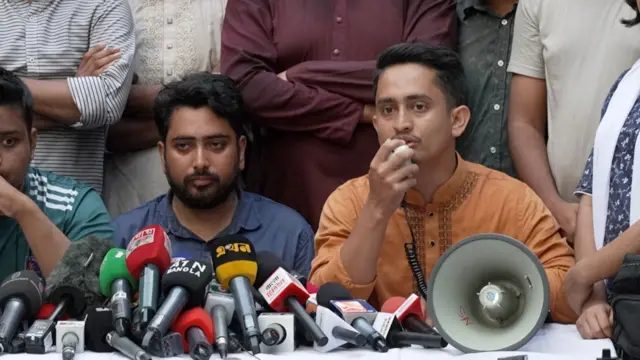
Nahid Islam, who is at the forefront of the movement and the number one coordinator of the committee, is the central leader of the Democratic Students’ Shakti formed out of Chhatra Odhikar Parishad. Coordinator number two, Sarjid Alam, was elected to the BCL panel in the Daksu election and was a member of parliament. Apart from this, there is also a member of the left student organization as coordinator in the committee.
Try to avoid controversy
The protesting students claim that the anti-discrimination student movement is not an anti-government political platform and special care is being taken to keep the movement above political debate.
Coordinators said that there is extra caution in setting up coordination committee, giving programs and taking money from someone. They have taken several precautionary steps from the experience of past quota movements.
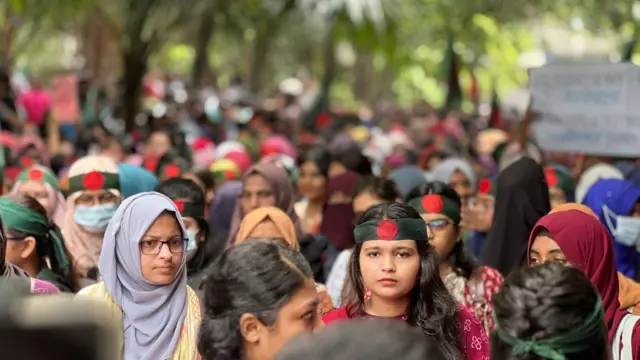
First of all, no one from the student organization of the anti-government political party was kept in the formation of the committee. The students said that they are aware of ensuring that no one gets the opportunity to implement any political agenda in this movement.
Sarjis Alam, one of the coordinators, said that since it is a general student movement, anyone of different ideologies can participate. However, there is no opportunity to use this movement for any political interest.
“There is no opportunity to introduce or use the banner of a political party; Nor is there any opportunity to express the agenda of that political party. And the day our movement ends, our banner anti-discrimination student movement will cease to be used.”

Sarjis Alam also said that no one who could cause controversy was placed in the coordination committee of the movement.
“We had a policy of not putting people who are actually known faces and who actually have political debates on the platform,” he added.
The coordinators also said that no representative of the anti-government political party BNP or the student organization of Jamaat has been placed in the coordination committee of the anti-discrimination student movement.
The quota movement started in Bangladesh on June 5 after the High Court declared the government circular of 2018 invalid and ruled to reinstate the freedom fighter quota.
In 2018, in the face of widespread student agitation, the government issued a circular canceling all quota systems including freedom fighters in first and second class government jobs.
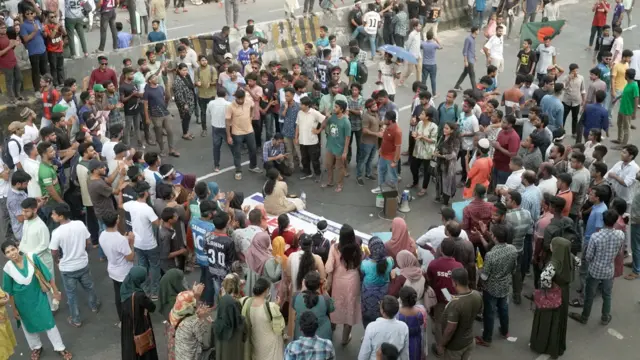
In the beginning, the students of the university protested with four-point demand including upholding the quota cancellation circular. Since the beginning of July, the students have been on continuous agitation calling for the boycott of class exams.
After the statement that the decision of the court on the quota was final from the top level of the government, the student movement turned into a one-sided movement. These students are demanding reform of quota in all cadres of government jobs through legislation in Parliament rather than the court.
Activists say the flaws in the quota system in Bangladesh have led to yet another student movement and a permanent solution is needed. And this time, these students want to ensure the final reform of the quota system in Bangladesh through the student movement.